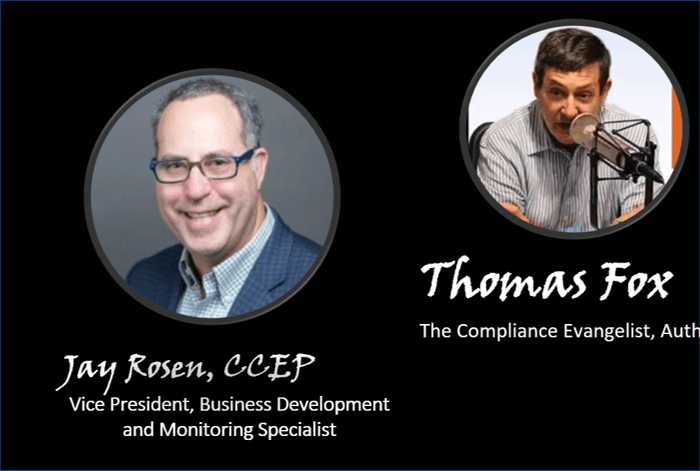Countdown to 500 – Jay Rosen on Moving from Reactive to Proactive Compliance
By Thomas Fox ,The Compliance Evangelist, Author
We are on the final countdown to Number 500. Next week, on Monday, August 31,
I will be celebrating my 500th Anniversary episode, where I will talk about some of the key changes
I have seen in compliance over the past 10 years, plus highlights from some of my 500 podcasts.
Today on the FCPA Compliance Report, I post Episode 498, which is an interview with Mr. Jay Rosen.Vice President, Business Development and Monitoring Specialist ,Affiliated Monitors, Inc
Up until about 10 years ago Rosen had not worked in the compliance arena. He has been a Hollywood screenwriter and then went off to find (what he called) “a real job” in the business world.
That journey led him to the Foreign Corrupt Practices Act (FCPA) compliance business segment where he has worked in business sales and development over the past 10 years.
Changes Rosen has seen from one who is outside the compliance profession
We visit about the changes Rosen has seen from one who is outside the compliance profession, at least initially, and some of the trends he observed including moving from reactive to proactive compliance. It is a fascinating episode.
10 years ago, Rosen was in a very different world. He moved to Southern California in the mid-80s to pursue a career as a screenwriter, which he did until the first decade of this century. He then went into private equity and had some other positions around business development. He landed at TransPerfect Translations marketing virtual data rooms. From there he moved into translations and discovered the FCPA. He began selling translation services.
He went through a learning curve, starting with the realization that “when you’re out there and you’re selling a technology solution, there comes a learning curve. Inevitably, you go into an office full of 30 people and it goes without saying that some piece of the technology is going to fail while you’re demonstrating it because he can’t get behind their firewall. It largely started out as training younger people in translations, who were largely doing it for a free meal. They were not passionate or even did not care about the solution.
However, as Rosen came to master that process, it became more than just running a demo. He said, “I found that if I was able to talk about either current events or if I could talk about how the solution would help them do better, that tended to give me a leg up on the competition.”
This insight was a “game-changer” for Rosen. It led them to begin to talk about translations not simply as a solution to an immediate problem, such as translating documents for a FCPA investigation, but allowed them to talk about translations as a part of any overall business solution for compliance.
Simultaneously, Rosen became engrossed in a lengthy self-study on the FCPA and, more particularly compliance, and from his days in corporate America he understood the need for business process.
By seeing that translation services could be used a part of an overall business process, compliance professionals (Rosen’s customers) began to see translation services as not simply a one-time only tool to be used.
Rosen provided the example of a Code of Conduct, which most companies want to refresh or update every 24 months or so.
The “translation services we were offering them was something that was really basic that we would take their document from English to another language. We would have a linguist translate the document into German, into Portuguese and to simple Chinese. If we put the fruits of that work into something called the translation memory, the TM, it could be replicated on an ongoing, go forward basis. As a Code might then begin to grow from maybe five languages into 15 to 20 to 40, it did not have to be redone each time.”
Rosen’s next observation was that the compliance professional he called was beginning to have a broader understanding of how the tools and services he and his team was offering could be used to help companies through continuous monitoring or continuous improvement to move their compliance program forward. He said that it “became a deeper level conversation. It went from being just transactional to now explaining how this could help to continually move a compliance program forward.”
Reactive to Proactive Compliance
Rosen then moved over to Affiliated Monitors, Inc. (AMI) as Vice President of Business Development. In this role his conversations with compliance changed to the suite of products and services AMI offered.
Here is where it all came together for Rosen as he was able to talk about services that moved compliance from reactive to proactive. But on the other side of the desk (or table) the customers and clients he was marketing to saw the benefits of proactive compliance which could stop an issue from becoming a legal violation or even corporate violation. This is a much more effective approach to compliance.
Rosen concluded with the following observations,
“I think we will look back at 2020 as the year of this pandemic, but 2020 was the year where you could get all the DOJ Update to the Evaluation and FCPA Resource Guide, 2nd edition.
Now, the ethics and compliance community has more specific instructions by the DOJ that you need to have a proactive approach to your ethics and compliance program. You need to take lessons learned, use data and data analytics to take a proactive approach to your compliance program.”
You can check out Rosen’s full remarks in today’s podcast here.
- Core Investigative Due Diligence - June 3, 2021
- Preparing for the Next Crisis - May 14, 2021
- Using Data in Compliance - March 29, 2021


Stay connected